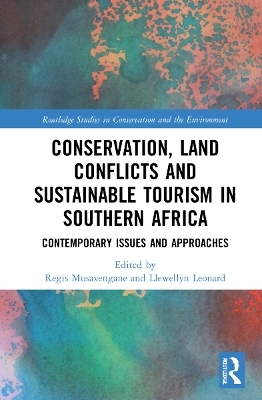
Conservation, Land Conflicts and Sustainable Tourism in Southern Africa
Routledge (Verlag)
978-1-032-03770-7 (ISBN)
This book examines the nexus between conservation, land conflicts, and sustainable tourism approaches in Southern Africa, with a focus on equity, access, restitution, and redistribution.
While Southern Africa is home to important biodiversity, pristine woodlands, and grasslands, and is a habitat for important wildlife species, it is also a land of contestations over its natural resources with a complex historical legacy and a wide variety of competing and conflicting issues surrounding race, cultural and traditional practices, and neoliberalism. Drawing on insights from conservation, environmental, and tourism experts, this volume presents the nexus between land conflicts and conservation in the region. The chapters reveal the hegemony of humans on land and associated resources including wildlife and minerals. By using social science approaches, the book unites environmental, scientific, social, and political issues, as it is imperative we understand the holistic nature of land conflicts in nature-based tourism. Discussing the management theories and approaches to community-based tourism in communities where there are or were land conflicts is critical to understanding the current state and future of tourism in African rural spaces. This volume determines the extent to which land reform impacts community-based tourism in Africa to develop resilient destination strategies and shares solutions to existing land conflicts to promote conservation and nature-based tourism.
The book will be of great interest to students, academics, development experts, and policymakers in the field of conservation, tourism geography, sociology, development studies, land use, and environmental management and African studies.
Regis Musavengane is a faculty member in the Department of Tourism, Hospitality & Leisure Sciences at the Midlands State University, Zimbabwe, and a Research Fellow in the School of Ecological and Human Sustainability at University of South Africa. He is a member of the IUCN's World Commission on Protected Areas (WCPA) Tourism and Protected Areas Specialist Group (TAPAS). He holds a PhD in Geography and Environmental Studies from the Witwatersrand University. Llewellyn Leonard is a Professor in the Department of Environmental Sciences, School of Ecological and Human Sustainability, College of Agriculture and Environment Sciences at the University of South Africa. He holds a PhD from Kings College, University of London and is a geographer and environmental sociologist. Before joining academia, he worked for a human rights environmental organisation working to support vulnerable communities exposed to environmental risks.
1. Land Conflicts in Southern Africa: the sustainability of Tourism and Conservation Part 1: Land governance and sustainable tourism management 2. An alternative governance approach towards addressing the intersection between mining developments and impacts on tourism and conservation sites in Southern Africa 3. The Deepening Challenge of Governance of Wildlife and Land Issues in the Context of Rising Citizen Participation in South Africa 4. Leadership and Governance Intricacies in Communally-owned Protected Areas: A Case of Somkhanda Game Reserve, KwaZulu Natal, South Africa Part 2: Managing natural disasters and land reform tourism crises 5. Complex effects of natural disasters on protected areas: the case of Cyclone Idai in Mozambique 6. The challenges and prospects of community-based tourism post Zimbabwe's land reform programme in the Midlands Province. 7. A review of post-restitution land rights agreement conflicts and their resolution at &Beyond Phinda Private Game Reserve in KZN, South Africa 8. Environmental Operational Research for Sustainable Tourism and Conflict Management in Community-based Natural Resources Management Part 3: Managing land use, access and benefit-sharing conflicts 9. The state, community-based tourism and wildlife user rights in tourism concessions in Botswana 10. COVID-19, conservation and tourism in Namibia’s Conservancies: socioeconomic and land-use impacts 11. Conflicts between Conservation and community livelihoods: lessons from KwaNibela and iSimangaliso Wetland Park, KwaZulu-Natal, South Africa. 12. The partially transformed frontier: Aspirations, limitations, and tensions of transfrontier conservation in the Maloti-Drakensberg Part 4: Conclusion 13. The future of community-based tourism amid socio-economic and political conflicts in Southern Africa
| Erscheinungsdatum | 18.04.2024 |
|---|---|
| Reihe/Serie | Routledge Studies in Conservation and the Environment |
| Zusatzinfo | 5 Tables, black and white; 7 Line drawings, black and white; 2 Halftones, black and white; 9 Illustrations, black and white |
| Verlagsort | London |
| Sprache | englisch |
| Maße | 156 x 234 mm |
| Gewicht | 453 g |
| Themenwelt | Naturwissenschaften ► Geowissenschaften ► Geografie / Kartografie |
| Sozialwissenschaften ► Soziologie ► Spezielle Soziologien | |
| Technik ► Architektur | |
| ISBN-10 | 1-032-03770-9 / 1032037709 |
| ISBN-13 | 978-1-032-03770-7 / 9781032037707 |
| Zustand | Neuware |
| Informationen gemäß Produktsicherheitsverordnung (GPSR) | |
| Haben Sie eine Frage zum Produkt? |
aus dem Bereich


